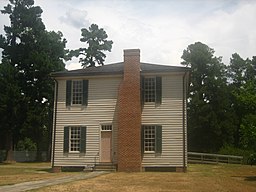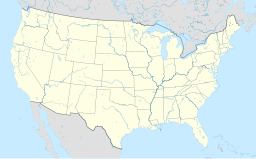Historic Washington State Park
| Historic Washington State Park | |
| Washington Historic state park | |
| Arkansas state park | |
|
Original Courthouse, 2008
|
|
| Named for: Washington, Arkansas | |
| Country | United States |
|---|---|
| State | Arkansas |
| Regions | Ouachita Mountains |
| County | Hempstead |
| City | Washington |
| Location | Visitor's Center/Courthouse |
| - coordinates | 33°46′25.6″N 93°41′2.6″W / 33.773778°N 93.684056°WCoordinates: 33°46′25.6″N 93°41′2.6″W / 33.773778°N 93.684056°W |
| Area | 101 acres (41 ha) |
| Opened | July 1, 1973 |
| Management | Arkansas Department of Parks and Tourism, Pioneer Washington Preservation Foundation |
| NRHP Reference # | 72000204 |
| Added to NRHP | June 20, 1972 |
| Boundaries | original 1824 plat of Washington |
| Website: Historic Washington State Park | |
Historic Washington State Park (formerly Old Washington Historic State Park) is a 101-acre (41 ha) Arkansas state park in Hemsptead County, Arkansas in the United States. The museum village contains a collection of pioneer artifacts from the town of Washington, Arkansas, which is a former pioneer settlement along the Southwest Trail. Walking interpretive tours are available throughout the 54 buildings. Washington served as a major trading point along the Southwest Trail, evolving into the Hempstead county seat and later the capital of Arkansas from 1863 to 1865 when Little Rock was threatened during the Civil War. The original plat of Washington was added to the National Register of Historic Places in 1972 as the Washington Historic District.
During the 1820s and 1830s, Washington was a stopover for travelers going to Texas. It was originally the county seat of Hempstead County until a new courthouse was completed in Hope, which was designated the seat of government in 1939. The park emphasizes regional 19th century history from 1824 to 1889. It is located in southwestern Arkansas east of Texarkana and near the entrance to Interstate 30.
The Southwest Trail ran from St. Louis, Missouri, to the Red River port of Fulton in Hempstead County some twelve miles from Washington. At the time, the Red River was the border between the United States and Mexico. The trail was a route taken by people headed to Mexican Texas. William B. Travis, Sam Houston, and Davy Crockett each separately traveled through Washington on their way to Texas. In the early 1830s until the 1840s, bands of Cherokee and Choctaw travelled through Old Washington on their way to Indian Territory under the Indian removal policies of U.S. President Andrew Jackson. In 1846, Washington was a mustering point for Arkansas troops marching south to fight under General Zachary Taylor in the Mexican War.
...
Wikipedia



